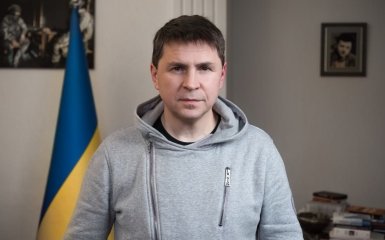Prevention of terrorist attacks by the Russian Federation on Ukrainian nuclear power plants involves several key measures. However, direct coercion remains the most important strategy.
Points of attention
- Direct coercion remains the most important strategy for preventing Russian terrorist attacks on Ukrainian nuclear power plants.
- It is necessary to increase the supply of air defense systems and missiles to strengthen the protection of nuclear plants.
- Cooperation with the IAEA and other organizations can help ensure nuclear safety in Ukraine.
- The Russian Federation may be preparing to strike nuclear facilities in Ukraine, which requires attention and response from Ukrainian leaders.
Only direct coercion can stop the Russian Federation
As the adviser to the head of the President's Office Mykhailo Podolyak said, Russia understands that the only way to wage war against the civilian population is the complete destruction of the energy infrastructure.
Their goal is not to destroy the nuclear power plants themselves, but to destroy the ability to transmit electricity to the general grid, in particular by striking nearby substations.
Russia is certainly developing such plans. This is obvious, because they are constantly looking for new genocidal tools. I emphasize — genocidal, because these are deliberate actions aimed at depriving people of access to electricity, heating and other basic needs.

Mykhailo Podolyak
Advisor to the Chairman of the Office of the President
Thus, Mykhailo Podolyak outlined several basic steps to prevent possible strikes:
Publicity — it is important to speak openly about Russia's terrorist actions and legally record them as crimes against humanity.
Strengthening air defense — it is necessary to insist on a significant increase in the supply of air defense systems and missiles for them.
International pressure — cooperation with the IAEA and other organizations that have an influence on the world market of nuclear technologies. This also applies to the impact on countries such as India and China.
But let's be honest here. Only coercion will stop the Russian Federation . That is, strength, that is, once again, a significant increase in the amount of damage that Ukraine can inflict on the territory of the Russian Federation. That is, a significant increase in the scale of the war on the territory of Russia. For this, new appropriate tools are needed, you are well aware of this, — noted Podolyak.
The Russian Federation may be preparing to strike Ukraine's nuclear facilities
Russia uses Chinese satellites to photograph Ukrainian nuclear power plants. Head of State Volodymyr Zelenskyi suggests that the Russian Federation may be preparing to strike nuclear facilities in Ukraine.
The Ukrainian leader emphasized that he intends to share these new data with the leaders of the countries during the UN General Assembly in the next few days.
As mentioned earlier, at the beginning of September Volodymyr Zelenskyy held a meeting with the Director General of the International Atomic Energy Agency (IAEA) Rafael Grossi.
The parties discussed the strengthening of nuclear security in Ukraine, in particular in the context of the inadmissibility of attacks on Ukrainian nuclear power plants and other energy facilities.
They also concluded that stable external power is critical to the safety of nuclear power plants.




